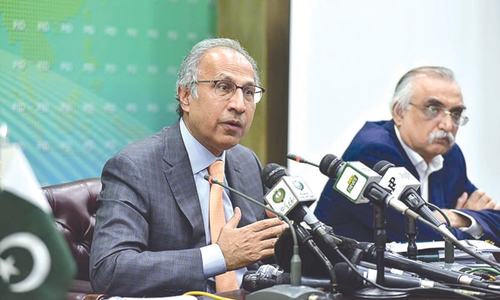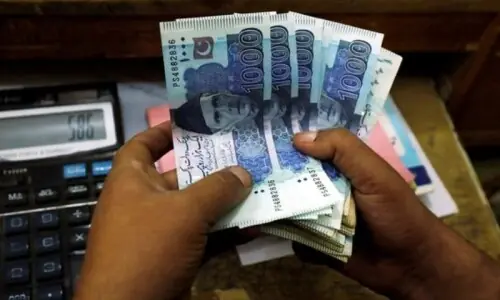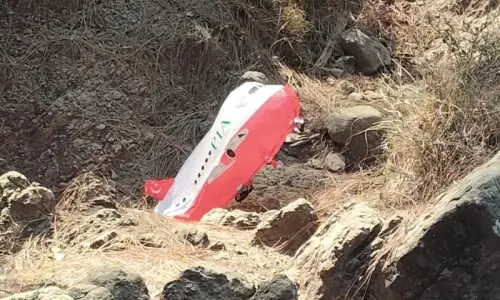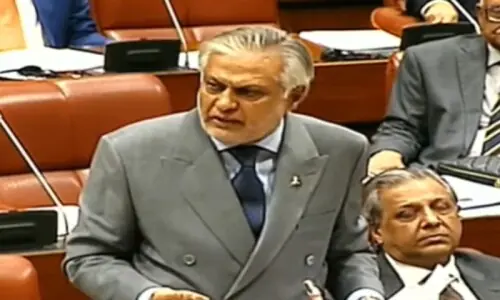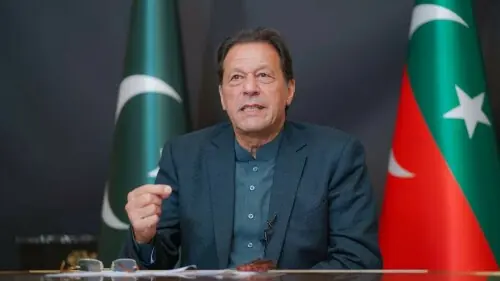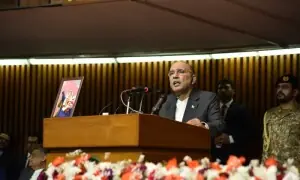The economy shrank in 2019 as the policy of stabilisation was actively pursued. With the IMF package, the external sector was moderately managed and the rupee held its ground after a free fall. Higher taxes, falling wages, inflation and fewer jobs did test the endurance of households though. The political chaos, Chinese reluctance, IMF’s pressure and the lack of enthusiasm in the private sector were still adding to the worries. Keen to hold on to anything positive, people found little option, but to…
People should brace themselves for another rough year ahead.
No one expects wonders from Prime Minister Imran Khan’s economic team unless geography comes to Pakistan’s rescue. Assuming that things stay the current course, the government’s claims of entering the growth phase in 2020 ring hollow.
Ordinary people care less about macro-economic indicators and more about paycheques. Anaemic wage growth, high inflation and high unemployment and under-employment are troubling. It won’t be surprising if the growing discontent spills over into streets in the months ahead.
For businessmen, uncertainty over the Financial Action Task Force (FATF) and tension with India on top of suppressed consumer demand, expensive credit and dearer utilities can be too much to even think about expansion in the immediate future.
Read: Economy in 2020
There is a flying chance that competing powers — the United States and China — indulge in a price war over the money bag dedicated for Pakistan. Its dividends will certainly be huge. Remember the dollar windfall following the Soviet invasion of Afghanistan in 1979 and how the West rediscovered Pakistan after it joined the war on terror in 2001?
In this Special Report, the Dawn B&F team attempts to offer tips, note threats and identify trends leading the way in business and society
Any downside shock, on the other hand, can send the economy, which is already teetering on the edge, reeling while eroding the popular base of the PTI with the possibility of upsetting the apple cart.
The reasons for the economic underperformance in the resource-rich country are too deep-seated and require major structural adjustments that go beyond the ones advised by the donors.
Economic problems have repeatedly been pointed out, but the economists of Pakistan have failed the nation as no alternative economic road map is available to ponder over.
Even with the best of intent, no government can fix Pakistan’s economy and put it on the trajectory of sustainable development. Unfortunately, capable minds are either lazy or blunted by greed — or shut out of the system by the beneficiaries of a dysfunctional state. Unless the country gets a young, dynamic team of economists who understand the relationship between fairness and efficiency and value the public input, our fate will continue to hang in the balance. The current crop of retired technocrats of the World Bank, International Monetary Fund (IMF) or Asian Development Bank (ADB) lacks energy, ideas and capacity to deliver.
To turn to basics, for want of a workable alternative elaborate framework covering the entire matrix of the economy, the solution ultimately lies in inclusive growth (where benefits are shared across classes and regions). For that to happen, the economy needs injections of capital investment in industry, agriculture and other supporting fields. It is clear that the private sector is reluctant and the government is broke.
Yes, the PTI economic dream team, under the tutelage of the IMF, is trying to improve accounting books and has succeeded somewhat in controlling external-sector vulnerabilities. But people don’t care about twin deficits. They need jobs and paycheques that allow them to live a decent life. In the absence of a windfall of monies from external sources, it is hard to imagine a major breakthrough on the economic front in 2020.
The background research and a closer study of trends in key sectors led us to believe that the growth rate will not pick up significantly, although the government may succeed in somewhat closing the yawning gap in the country’s exports and imports. Exports in the absence of diversified exportable surpluses or possible markets may increase moderately if at all while imports can fall but not at the speed and scale of 2019. With the cost of business escalating, reining in inflation looks difficult.
Dawn that is often perceived to be pushing doom-and-gloom scenarios actually projected a rosy picture at the start of 2019. Truth be told, year-end data proved our projections were unrealistically optimistic, although we did succeed in capturing the trend right. Yes, growth moderated but more than what we thought, inflation did increase but higher than our projection, the trade deficit fell but at a smaller scale and the rupee did end the year fairly stable but the dollar was five rupees costlier and returned to the current rate after scaling to Rs161 to close at Rs155 in the open market.
Any downside shock can send the economy reeling while eroding the popularity of the PTI
Last year, we projected growth of 4.5 per cent against less than 3pc realised, inflation of 8.9pc against 11.5pc reported, trade deficit of $29 billion against $36bn and exchange rate of 150. The Ministry of Commerce provided trade data for the calendar year.

Past markers helped us revise our projections for 2020. We expect the economy to grow around 3pc, see inflation at 16pc, trade deficit at $30bn and the exchange rate at 157.
Relative peace in Afghanistan and growing unrest in India propelling to the next level can change the regional matrix. Early signs of the swaying US perception of Pakistan, dumped earlier as an unreliable ally misappropriating funds, are already visible. The softened stance of the IMF and other multilateral donors lends support to this reading. With President Trump sucked in political ramblings, can we hinge our hopes there? My guess is as good as yours.
The economic logic dictates that China that has already invested $28bn in Pakistan will not turn its back on us now even if it is not perfectly satisfied with the progress or the way mega projects are being handled by the PTI government. The long-time friend can’t probably afford to let its partner fall in the lap of the West for want of action on its part.
It is relevant to quote from the IMF’s first review report: “Growth is currently weak and significant fiscal adjustment is needed in coming years. While the risk of a disorderly adjustment has abated due to the well-managed transition to a market-determined exchange rate and the availability of external financing, risks to the economic outlook are significant.
“Fiscal slippages and, more generally, resistance to reform from vested interest groups could undermine the programme’s fiscal consolidation strategy and put debt sustainability at risk. Moreover, the absence of a majority by the ruling party in the upper house may hinder the adoption of legislation needed to achieve programme objectives. Also, provinces may under-deliver on their commitments to budget parameters and related objectives over the programme period.
“Lukewarm progress on structural reforms especially those aimed at strengthening governance of economic institutions may result in stagnant economic activity and little tangible benefits for the population, intensifying pressures to backtrack on policy commitments. Failure to meet programme objectives could jeopardise the availability of external financing.
“Also, a potential blacklisting by the FATF could result in a freeze of capital flows and lower investment to Pakistan. Finally, the global economic backdrop poses increasing headwinds and weaker than expected activity may affect growth and current account deficit projections.”
Published in Dawn, The Business and Finance Weekly, January 6th, 2020



